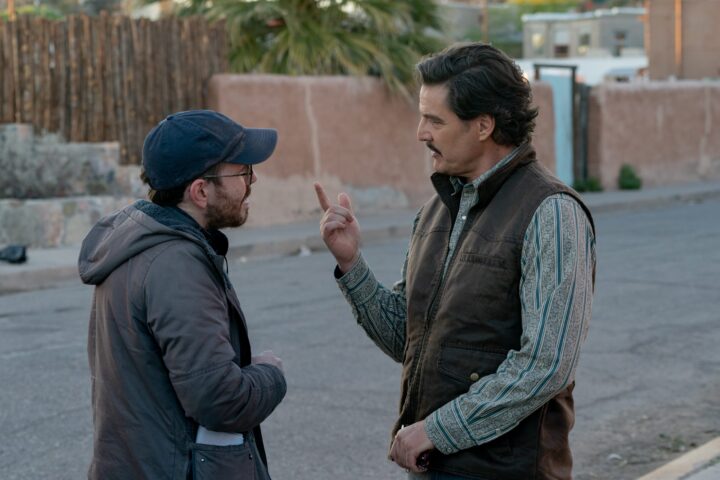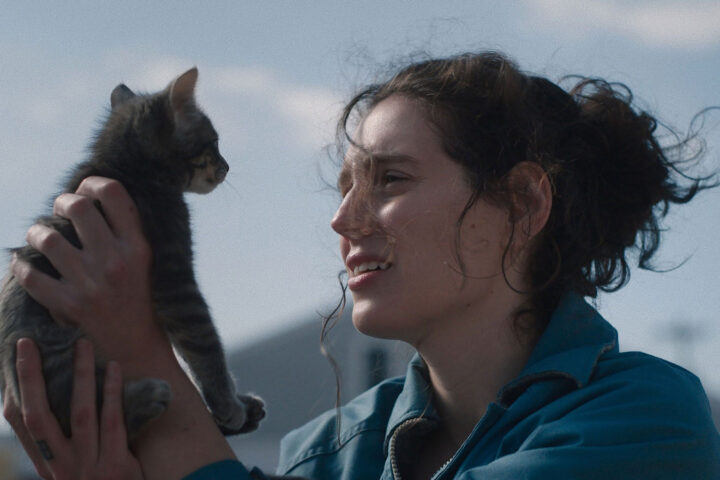It’s that time of year again—when Oscar casts his golden glow on the highest achievements of the movie year (or at least those with the largest publicity budgets). Who made the list? Who was snubbed? What do the nominations tell us about who or what might prevail on March 12? With the Oscar race formally underway, this week’s nods clarify what is on the minds—and what is not—of this season’s Academy voters.
An unprecedented campaign surprises in a key race
The best performance in a film last year came from To Leslie’s Andrea Riseborough, playing an alcoholic, down-on-her-luck West Texas mother racing to the bottom before clawing her way toward redemption. Riseborough, the Royal Academy of Dramatic Art alum who has been in the movies for 15 years and exhibits a Streep-level chameleonic versatility, tore into the picture with a performance of heart wrenching pathos, reducing those who saw it to tears. The trouble was that no one saw it. Premiering at the SXSW festival last March before being dumped into theaters a full seven months later for a mere one-week run, it grossed a paltry $27,322 in box office receipts.
Until recently, it appeared all was lost for Riseborough’s awards chances, her film’s modest distributor lacking campaign funds and unable to afford a single industry trade advertisement. With the exception of an Independent Spirit Award nod (which she may yet win) and our recent Chicago Film Critics Association nomination for Best Actress, Riseborough was wholly absent from “the conversation”—an annual, cash-infused buzz machine orchestrated by publicists, bloggers and pundits, aggressively marketing their high-profile talent to the podium.
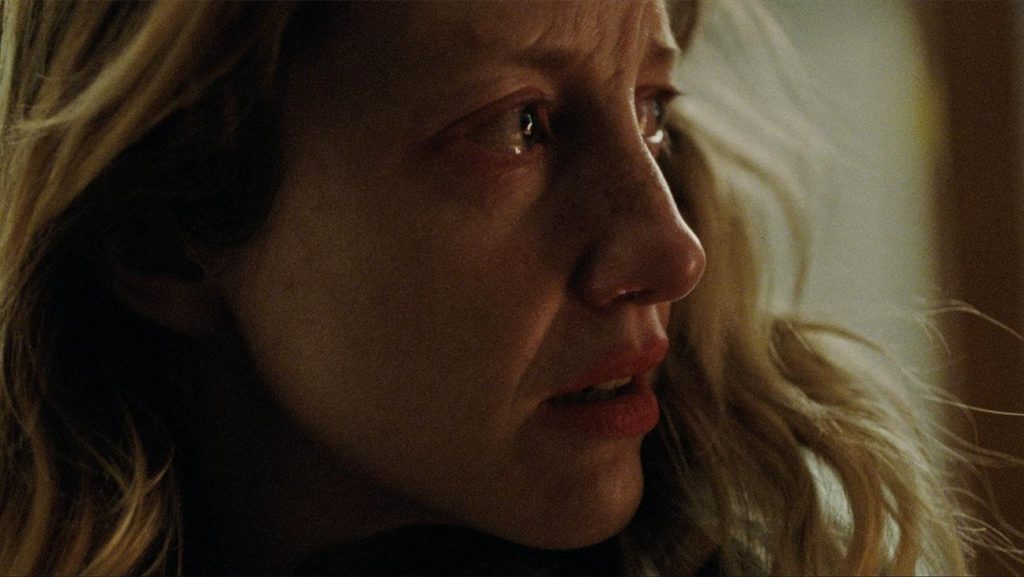
Enter the Hollywood A-list, who got wind of director Michael Morris’ tiny indie gem and orchestrated an all-hands-on-deck, word-of-mouth campaign, taking to their social networks and canvassing fellow voters to showcase Riseborough’s performance. More than fifty high-profile actors—Frances Fisher, Charlize Theron, Jane Fonda, Kate Winslet, Gwyneth Paltrow, Edward Norton, Mark Ruffalo, Sarah Paulson, Amy Adams, Jennifer Aniston and many more—were so bowled over by Riseborough’s searing portrait of addiction and loss that they lobbied their industry peers to see the performance, hosting nightly screening discussions and podcasts timed to coincide with last minute balloting. This unprecedented campaign strategy netted Riseborough her first Oscar nod through a coalition of passion votes—an unmistakable reproach to the typical industry campaigning suffused with hundreds and thousands of dollars from studio publicity budgets, lavish promotional parties and the gamut of voter circuit schmoozing.
For Riseborough, the quality of the performance and intense industry admiration propelled her to the nominees circle from a grassroots support initiative the likes of which has never before occurred in Oscar history. Sure, there have been eyebrow-raising, unorthodox past maneuvers where actors lobbied their own work—Sally Kirkland snagged a Golden Globe for 1987’s Anna and Melissa Leo an Oscar for 2010’s The Fighter—but such individual efforts didn’t approach the tactical organization conducted on Riseborough’s behalf this year. The message—actors know good acting, and this year they insisted that Oscar take note. Riseborough’s To Leslie performance is quite simply the year’s finest, and her nomination a testament to actors’ advocacy and passion for their craft. Sometimes, it really is about the work, not the industry cronyism or publicity, and recognizing Riseborough is the rare instance in which voters have forced the Academy to look further than celebrity, box office receipts and media fanfare in an industry that, ironically, can sometimes be blind to genuine artistry.
A generational showdown in Best Picture?
One of this year’s most daring films also polarized viewers, and in garnering eleven Oscar nods—the most of any film this year—Everything Everywhere All at Once is now in prime position as this year’s Best Picture frontrunner. Released in March of last year, the critical hit quickly built a fervent fan base, ultimately returning an impressive $104 million global box office take against a modest $25 million budget. Telling the fantastical tale of a Chinese laundromat owner and mother—played with great feeling and physicality by a career high Michelle Yeoh—who experiences an anxiety crisis (and universe transporting superpowers) when her befuddled husband (Key Huy Quan), alienated daughter (Stephanie Hsu), disapproving father (James Hong) and an imperious I.R.S. bureaucrat (Jamie Lee Curtis) all converge on a single day, writing-directing duo Daniel Kwan and Daniel Scheinert delivered a wildly creative “multiverse” movie for the ages.
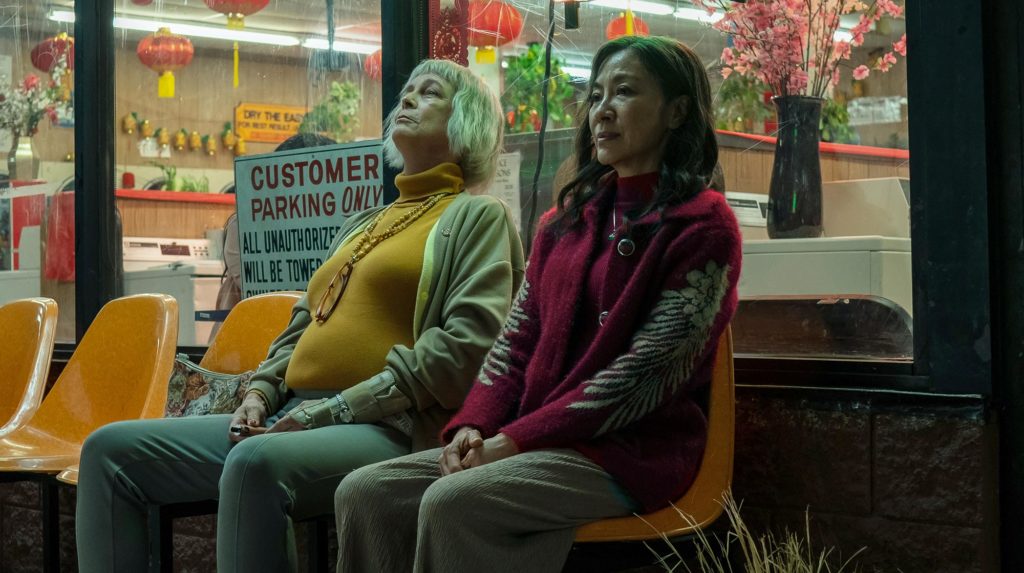
Addressing middle-aged malaise, ennui, disillusionment with the road traveled and the need for human kindness in an overwhelmingly cluttered digital world—all in the context of dozens of parallel universes and lives—the picture is said to be a generational divider. While Generation Z and Millennials seem to have taken the film as their own, Generation X and Baby Boomers have purportedly been lukewarm on its frenetic, postmodern aesthetic: “I couldn’t figure out what was going on” has been a familiar, head scratching refrain. Yet despite such suggested generational demarcations, many age 50+ viewers, wowed by the film’s style and energy, have also shared enthusiasm. Regardless of viewer demographics, the film’s admirers love its gonzo, postmodern style, zigzagging multiple narratives and wild mix of tones, while its headache-ridden detractors are tuning out, reaching for Tylenol or “turning it off” altogether.
This polarization begs the million-dollar question, which is whether a film inspiring such opposite reactions can prevail on the Academy’s preferential Best Picture ballot, which rewards films that rank highly while penalizing those that divide voters (and end up ranked at both top and bottom of the ballot). Such controversial films are unlikely to survive multiple rounds of ballot counting, nearly always required to determine a winner. Yet given the film’s many admirers, could their enthusiastic support give the film a win on the first round of voting (with 50% of number one votes)? If such a victory were to happen, it would undoubtedly be driven by the Academy’s younger, diverse, progressive contingent of new and recent members, elbowing aside the old guard establishment bloc. While this optimistic scenario seems unlikely, it is undeniable that no other contender has such broad industry and fan support. That is not nothing.
Women filmmakers fail to make the cut
For the past two years, women filmmakers have taken the Oscar for Directing—Chloe Zhao’s Nomadland and Jane Campion’s The Power of the Dog were major artistic achievements and “high art” winners. This year, female directors, including Chinonye Chukwu (Till), Gina Prince-Bythewood (The Woman King) and Sarah Polley (Women Talking) failed to make the cut. Instead, Academy members nominated Martin McDonagh (The Banshees of Inisherin), Daniel Kwan and Daniel Scheinert (Everything Everywhere All at Once), Steven Spielberg (The Fabelmans), Todd Field (TÁR) and Ruben Östlund (Triangle of Sadness).
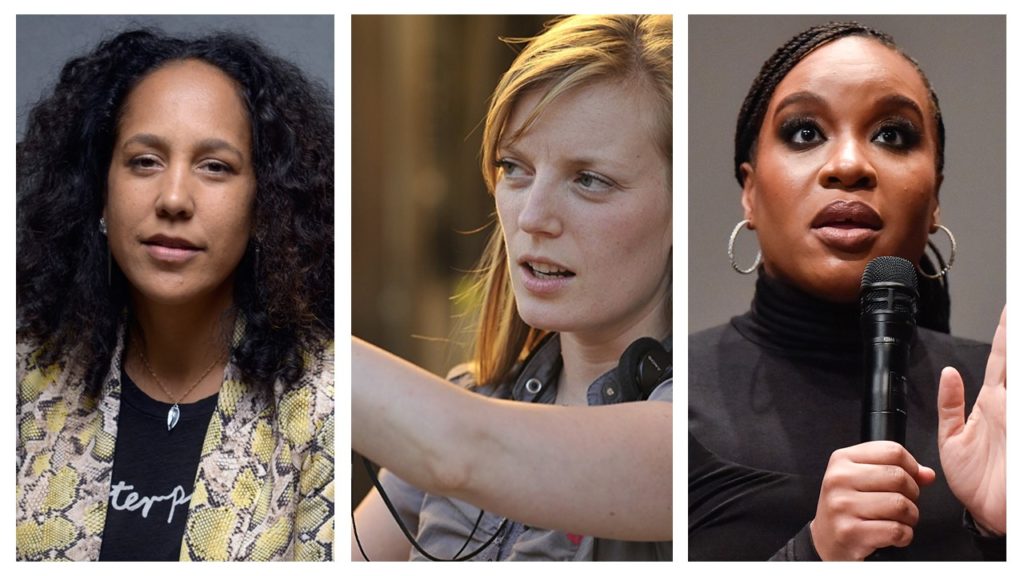
In some corners the outrage was immediate, followed by accusations that women were “shut out.” But on closer inspection, the nominated directors’ films were more broadly heralded as the year’s best, both critically and according to bodies including The Golden Globes, Critics Choice and BAFTA (where Prince-Bythewood received a nod). Of the three, Polley’s film (which I liked the least) fared best, receiving Best Picture and Adapted Screenplay nods as well as recent Critics Choice recognition. It is worth noting that the category also failed to recognize former winner James Cameron for the dazzling innovation of Avatar: The Way of Water (four nominations), Baz Luhrmann for his hyperactive Elvis (eight nominations) and Damien Chazelle, whose go-for-broke Hollywood takedown Babylon barely registered, despite Chazelle winning the prize for 2016’s La La Land.
Yet compared to Till, The Woman King and Women Talking, Steven Spielberg’s The Fabelmans, a lukewarm personal memoir, was pedigreed tedium and less distinguished. Certainly it was far from the top of Spielberg’s canon and were it not for the industry’s desire to back pat a beloved filmmaker for his decision to share his childhood on screen, his nod might (and should) have gone to more deserving recipient.
Freshman Oscar nominees rule top categories
Often Oscar likes repeat nominees, and for most winners it takes a few tries to actually capture the gold. Some, like Glenn Close—with 8 nominations across forty years—are perpetual also-rans. But this year, a staggering 80% of acting nominees in the top categories are first-timers, lending excitement to a freshman class of Oscar newbies looking to break tradition by cruising to fledgling victories.
While difficult to believe, the great Colin Farrell picked up the first Oscar nomination of his twenty-three-year career for his melancholy work in The Banshees of Inisherin, for which he also took the Venice Film Festival’s trophy. Across the Best Actor category, Farrell’s competitors—Elvis’ Austin Butler, Living’s Bill Nighy, Aftersun’s Paul Mescal and The Whale’s Brendan Fraser—are all first-timers.
On the supporting front, Farrell’s nominated Banshees co-stars Brendan Gleeson and Barry Keoghan are new to the Oscar shuffle, as are Everything Everywhere All at Once frontrunner Key Huy Quan and Causeway’s Brian Tyree Henry. Only Judd Hirsch, for his eight-minute, overacted scenery chewing in The Fabelmans is a prior nominee for his turn as the compassionate psychiatrist in Robert Redford’s 1980 Best Picture winner Ordinary People.
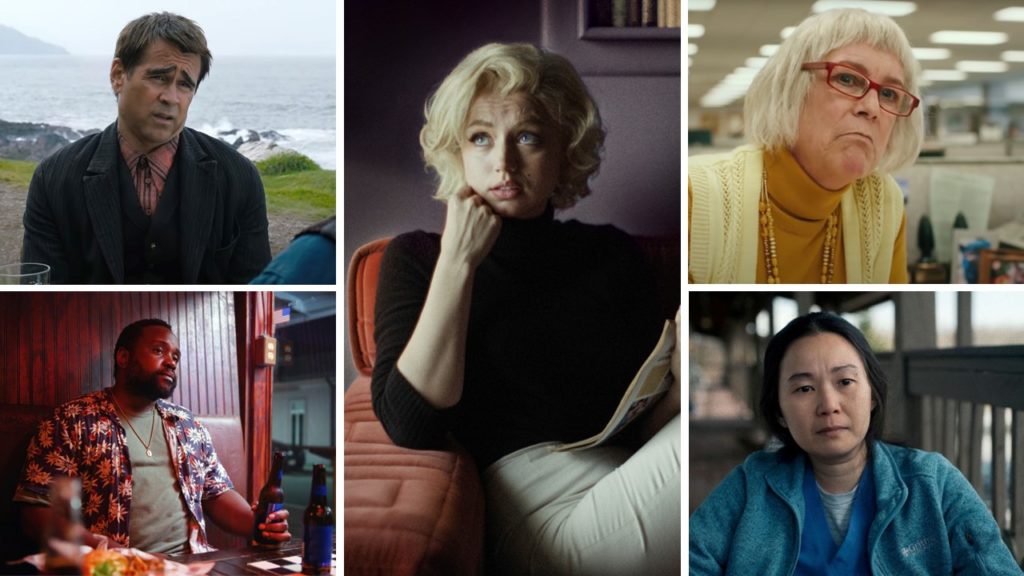
On the Best Actress front, Cate Blanchett (TÁR) and Michelle Williams (The Fabelmans) are Oscar veterans, Blanchett claiming two Oscar wins from 8 nominations while Williams has yet to take the statuette, despite an impressive 5 nods. Breakout Michelle Yeoh, who has been in the business for forty years, earned her first nod for leading the Everything Everywhere All at Once brigade, as did Cuban actress Ana de Armas for her devastating Marilyn Monroe turn in the controversial Blonde. And then we have Andrea Riseborough, landing her first and unexpected To Leslie spot for perhaps the best ever movie portrait of addiction and recovery.
Four of this year’s supporting actresses are newcomers to Oscar, including The Whale’s Hong Chau, The Banshees of Inisherin’s Kerry Condon and a pair of Everything Everywhere All at Once co-stars, the venerable Jamie Lee Curtis (finally recognized after forty-five years in the biz!) and new star Stephanie Hsu. Amongst her fellow nominees, only frontrunner Angela Bassett, who got close to Oscar for embodying Tina Turner to the hilt in 1994’s What’s Love Got to Do With It? is a previous nominee. Bassett, one of America’s great actresses defined by her intensity, is widely expected to take this year’s award for her celebrated work in Black Panther: Wakanda Forever.
While first-time nominees may have captured Oscar’s attention, past favorites Viola Davis (The Woman King), Olivia Colman (Empire of Light) and Margot Robbie (Babylon) failed to receive nods. And one newcomer who deserved recognition ultimately missed—Danielle Deadwyler was terrific as Emmett Till’s courageous mother Mamie in Till, which was little seen and not effectively campaigned by its studio.
Blockbusters return to the Best Picture lineup
Megahits Top Gun: Maverick and Avatar: The Way of Water galvanized the international ticket buying public, taking in a combined $3.5 billion (and climbing) at the global box office and credited with “saving” the theatrical moviegoing experience. Both demonstrated that ticket buyers of all ages and backgrounds, even older audiences thought to be wary in a post-COVID environment, will show up in droves for the right pictures. In this case, that meant an exhilarating throw-back entertainment featuring a beloved Hollywood star and a technique-advancing work of art from the best action director of the modern age.
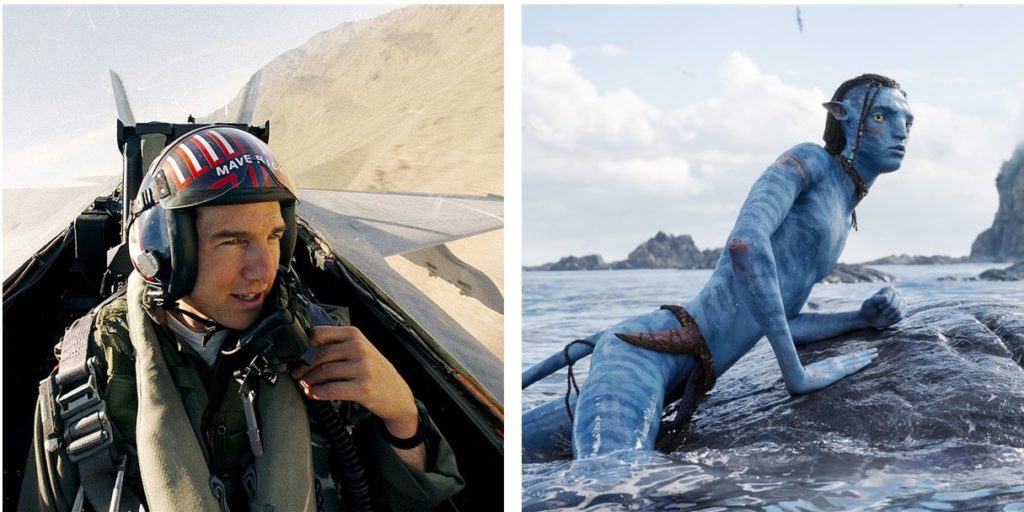
In recent years, big box office films—the kind around which the public used to rally and would then become major Oscar players, like Titanic, Gladiator and Braveheart—seemed to have fallen out of favor with Academy tastes. Perhaps such modern, large-scale equivalents primarily revolving around superheroes and adolescent fantasies have not been good enough. Consequently, voters of late have turned inward to smaller, more personal or socially observant films, nearly all of which failed to translate into commercial success or mass audience engagement even upon sweeping the awards.
What sets Top Gun: Maverick and Avatar: The Way of Water apart from the assembly line studio claptrap is that both are genuinely rousing pictures and cutting-edge filmmaking from terrific directors—they deliver what we used to expect of great commercial entertainments. Top Gun: Maverick was the best example of an action film in decades and was superbly shot, edited and constructed, and featured the return of a beloved movie star in a signature role. Avatar: The Way of Water offered an experiential, breathtaking immersion into a world so wondrous it was the unmistakable mark of genius and a technical envelope pusher that felt a decade ahead of its contemporaries. While neither seems destined to take this year’s Best Picture, both represent Oscar’s welcome return embrace of the commercial blockbuster and top-notch populist entertainment.
Marvel headed to first acting win?
While superhero films have made billions at the box office, highly critical A-list directors and more serious-minded movie audiences—as well as Oscar himself—have paid little mind. In the solid 15 years since 2008’s inaugural Marvel installment Iron Man, the franchise and its topflight casts have failed to manage a single acting Oscar nod until this year. Never mind that Joaquin Phoenix took the Best Actor trophy for his stunning work in the disturbing social thriller Joker, which while technically a DC Comics property had much on its serious mind about mental illness, urban alienation and decay.

Enter Angela Bassett, doing commanding 2022 work as Queen Ramonda in Black Panther: Wakanda Forever. Bassett, who narrowly missed an Oscar after a 1994 nomination for What’s Love Got to Do With It?, is one of the greats—and when you hire such high-caliber talent, the quality of the writing and character is exponentially elevated. This is the mark of a great actor, to take a role that in other hands could be serviceable or stock and leave you feeling that you have witnessed something substantively thrilling. Bassett does this with every role, and while sometimes relegated to workmanlike, punch-through supporting turns, always brings power and authority to the screen. Having won Golden Globe and Critics Choice awards this season, Bassett is next headed for the Screen Actors Guild recognition, where a win would clear her path to Oscar. While it might be tempting to call her impending Oscar a years-in-the-making victory for Marvel Studios, the glory here belongs wholly to its regal star.

